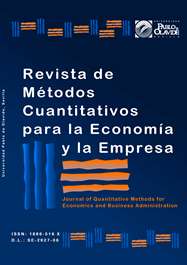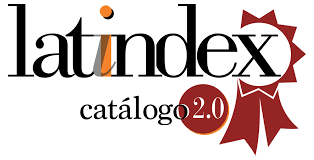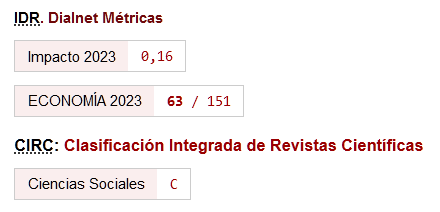Análisis del uso de las tecnologías de la industria 4.0 como ventaja competitiva
DOI:
https://doi.org/10.46661/revmetodoscuanteconempresa.6311Palabras clave:
industria 4.0, tecnología , ventaja competitiva, rendimiento empresarialResumen
La Industria 4.0 nació debido a un gran avance y desarrollo tecnológico que han llevado a que la información se convierta en un elemento valioso para fortalecer ventajas competitivas y procesos de innovación para mejorar el desempeño productivo de las organizaciones. Para esto, la comunidad científica y empresarial está debatiendo sobre los efectos negativos y positivos de estas tecnologías y su relación con la gestión empresarial, en la búsqueda de soluciones sostenibles para las organizaciones. En este sentido, el objetivo principal de este artículo es identificar las percepciones de los gerentes de pymes en Colombia sobre la importancia de implementar tecnologías de la información para promover ventajas competitivas que coincidan con el ritmo de la industria 4.0. El método de investigación utilizado en el estudio se analizó mediante muestreo utilizando el cuestionario como herramienta de recolección de datos. 75 gerentes proporcionaron respuestas completas y útiles a esta investigación. Los datos recolectados se analizaron mediante diferentes modelos de regresión que se llevaron a cabo; mostrando como principales resultados que un mayor uso de estas tecnologías genera un impacto positivo en la ventaja competitiva relacionada con precio / costo, calidad, confiabilidad en la entrega, innovación de producto y tiempo de comercialización. Para el análisis se utilizó el paquete estadístico para las ciencias sociales (SPSS).
Descargas
Citas
Abdelkader, B., & Abed, B. (2016). The effect of information technology on competitive advantage of firm: the role of environmental uncertainty. The International Journal of Management Science and Information Technology (IJMSIT), 22, 16-39.
Abubakar, I., & Mohammad, H.I. (2019). Linking Product Line Strategies to Competitive Advantage: An Empirical Study of Nigerian Food and Beverages Industry. SEISENSE Journal of Management, 2(4), 65-78. https://doi.org/10.33215/sjom.v2i4.166
Adamik, A., & Nowicki, M. (2018). Preparedness of companies for digital transformation and creating a competitive advantage in the age of Industry 4.0. Proceedings of the International Conference on Business Excellence, 12(1), 10-24. https://doi.org/10.2478/picbe-2018-0003
Alvarez-Aros, E.L., & Bernal-Torres, C.A. (2021). Technological competitiveness and emerging technologies in industry 4.0 and industry 5.0. [Article]. Anais Da Academia Brasileira De Ciencias, 93(1), 0191290. https://doi.org/10.1590/0001-3765202120191290
Barreto, L., Amaral, A., & Pereira, T. (2017). Industry 4.0 implications in logistics: an overview. Procedia Manufacturing, 13, 1245-1252. https://doi.org/10.1016/j.promfg.2017.09.045
Bayo, M.A., Billón, M., & Lera, F. (2008). Skills, technology and organisational innovation in Spanish firms. International Journal of Manpower, 29(2), 122-145. https://doi.org/10.1108/01437720810872695
Berawi, M.A. (2018). Utilizing big data in industry 4.0: Managing competitive advantages and business ethics. International Journal of Technology, 3(1), 430-433. doi: https://doi.org/10.14716/ijtech.v9i3.1948
Bratić, D. (2011). Achieving a competitive advantage by SCM. IBIMA Business Review, 2011, 1-13. https://doi.org/10.5171/2011.957583
Brettel, M., Friederichsen, N., Keller, M., & Rosenberg, M. (2014). How virtualization, decentralization and network building change the manufacturing landscape: An Industry 4.0 Perspective. International journal of mechanical, industrial science and engineering, 8(1), 37-44. http://waset.org/publications/9997144/how-virtualization-decentralization-and-network-building-change-the-manufacturing-landscape-an-industry-4.0-perspective
Büchi, G., Cugno, M., & Castagnoli, R. (2020). Smart factory performance and Industry 4.0. Technological Forecasting and Social Change, 150, 119790. https://doi.org/10.1016/j.techfore.2019.119790
Calış, M., & Akdemir, B. (2021). A study to determine the effects of industry 4.0 technology components on organizational performance. Technological Forecasting and Social Change, 167, 120615. https://doi.org/https://doi.org/10.1016/j.techfore.2021.120615
Dalenogare, L.S., Benitez, G.B., Ayala, N.F., & Frank, A.G. (2018). The expected contribution of Industry 4.0 technologies for industrial performance. International Journal of Production Economics, 204, 383-394. https://doi.org/https://doi.org/10.1016/j.ijpe.2018.08.019
Fatorachian, H., & Kazemi, H. (2020). Impact of Industry 4.0 on supply chain performance. Production Planning & Control, 1-19. https://doi.org/10.1080/09537287.2020.1712487
Ghobakhloo, M. (2020). Industry 4.0, digitization, and opportunities for sustainability. Journal of Cleaner Production, 252, 119869. https://doi.org/10.1016/j.jclepro.2019.119869
Hair, J.F., Black, W.C., Babin, B.J., & Anderson, R.E. (2010). Multivariate Data Analysis, 7th ed.,
Prentice Hall, Upper Saddle River, NJ.
Hamada, T. (2019). Determinants of Decision-Makers’ Attitudes toward Industry 4.0 Adaptation. Social Sciences, 8(5), 140. https://doi.org/10.3390/socsci8050140
Haseeb, M., Hussain, H.I., Ślusarczyk, B., & Jermsittiparsert, K. (2019). Industry 4.0: A solution towards technology challenges of sustainable business performance. Social Sciences, 8(5), 154. https://doi.org/10.3390/socsci8050154
Hayes, A.F., & Coutts, J.J. (2020). Use Omega Rather than Cronbach’s Alpha for Estimating Reliability. But…. Communication Methods and Measures, 14(1), 1-24. https://doi.org/10.1080/19312458.2020.1718629
Hernández, R., Fernández, C., & Baptista, P. (2010). Metodología de la Investigación, 5th ed. McGraw - Hill/ Interamericana Editores.
Horváth, D., & Szabó, R.Z. (2019). Driving forces and barriers of Industry 4.0: Do multinational and small and medium-sized companies have equal opportunities? Technological Forecasting and Social Change, 146, 119-132. https://doi.org/10.1016/j.techfore.2019.05.021
Kagermann, H., Helbig, J., Hellinger, A., & Wahlster, W. (2013). Recommendations for implementing the strategic initiative INDUSTRIE 4.0: Securing the future of German manufacturing industry; final report of the Industrie 4.0 Working Group. http://thuvienso.dastic.vn:8080/dspace/handle/TTKHCNDaNang_123456789/357
Kusiak, A. (2018). Smart manufacturing. International Journal of Production Research, 56(1-2), 508-517. https://doi.org/10.1080/00207543.2017.1351644
Lee, J.H., Phaal, R., & Lee, S.-H. (2013). An integrated service-device-technology roadmap for smart city development. Technological Forecasting and Social Change, 80(2), 286-306. http://dx.doi.org/10.1016/j.techfore.2012.09.020
Lobova, S.V., Bykovskaya, N.V., Vlasova, I.M., & Sidorenko, O.V. (2019). Successful experience of formation of industry 4.0 in various countries. Industry 4.0: Industrial Revolution of the 21st Century (pp. 121-129): Springer. https://doi.org/10.1007/978-3-319-94310-7_12
Magruk, A. (2016). Uncertainty in the sphere of the industry 4.0–potential areas to research. Business, Management and Education, 14(2), 275-291. https://doi.org/10.3846/bme.2016.332
Malik, A. (2019). Creating competitive advantage through source basic capital strategic humanity in the industrial age 4.0. International Research Journal of Advanced Engineering and Science, 4(1), 209-215. https://www.irjaes.com/pdf/V4N1Y18-IRJAES/IRJAES-V4N1P195Y19.pdf
Masood, T., & Sonntag, P. (2020). Industry 4.0: Adoption challenges and benefits for SMEs. Computers in industry, 121, 103261. https://doi.org/10.1016/j.compind.2020.103261
Moeuf, A., Pellerin, R., Lamouri, S., Tamayo-Giraldo, S., & Barbaray, R. (2018). The industrial management of SMEs in the era of Industry 4.0. International Journal of Production Research, 56(3), 1118-1136. https://doi.org/10.1080/00207543.2017.1372647
Morales, P.G., España, J.A.A., Zárate, J.E.G., González, C.C.O., & Frías, T.E.R. (2017). La nube al servicio de las pymes en dirección a la industria 4.0. Pistas Educativas, 39(126), 85-98. http://itcelaya.edu.mx/ojs/index.php/pistas
Müller, J.M., & Däschle, S. (2018). Business Model Innovation of Industry 4.0 Solution Providers Towards Customer Process Innovation. Processes, 6(12), 260. https://doi.org/10.3390/pr6120260
Müller, J.M., Veile, J.W., & Voigt, K.-I. (2020). Prerequisites and incentives for digital information sharing in Industry 4.0–An international comparison across data types. Computers & Industrial Engineering, 148, 106733. https://doi.org/10.1016/j.cie.2020.106733
Nara, E.O.B., da Costa, M.B., Baierle, I.C., Schaefer, J.L., Benitez, G.B., do Santos, L.M.A.L., & Benitez, L.B. (2021). Expected impact of industry 4.0 technologies on sustainable development: A study in the context of Brazil's plastic industry. Sustainable Production and Consumption, 25, 102-122. https://doi.org/10.1016/j.spc.2020.07.018
Natalia, I., & Ellitan, L. (2019). Strategies to achieve competitive advantage in industrial revolution 4.0. International Journal of Research Culture Society, 3(6), 10-16.
Nyuur, R.B., Ofori, D.F., & Amponsah, M.M. (2019). Corporate social responsibility and competitive advantage: A developing country perspective. Thunderbird International Business Review, 61(4), 551-564. https://doi.org/10.1002/tie.22065
Oesterreich, T.D., & Teuteberg, F. (2016). Understanding the implications of digitisation and automation in the context of Industry 4.0: A triangulation approach and elements of a research agenda for the construction industry. Computers in industry, 83, 121-139. http://dx.doi.org/10.1016/j.compind.2016.09.006
Pereira, A., & Romero, F. (2017). A review of the meanings and the implications of the Industry 4.0 concept. Procedia Manufacturing, 13, 1206-1214. https://doi.org/10.1016/j.promfg.2017.09.032
Pietrewicz, L. (2019). Technology, business models and competitive advantage in the age of Industry 4.0. Problemy Zarządzania, 17(2 (82)), 32-52. https://doi.org/10.7172/1644-9584.82.2
Ralston, P., & Blackhurst, J. (2020). Industry 4.0 and resilience in the supply chain: a driver of capability enhancement or capability loss? International Journal of Production Research, 1-14. https://doi.org/10.1080/00207543.2020.1736724
Rivero, J.M.L., Soler, J.A.P., & Delgado, F.M. (2022). Evaluación del nivel de sostenibilidad en la gestión de las tecnologías y sistemas de información a través de la Lógica Difusa Compensatoria. Revista de Métodos Cuantitativos para la Economía y la Empresa, 33, 154-168.
Shamim, S., Cang, S., Yu, H., & Li, Y. (2016). Management approaches for Industry 4.0: A human resource management perspective. Paper presented at the 2016 IEEE Congress on Evolutionary Computation (CEC). https://doi.org/10.1109/CEC.2016.7748365
Stentoft, J., Jensen, K.W., Philipsen, K., & Haug, A. (2019). Drivers and Barriers for Industry 4.0 Readiness and Practice: A SME Perspective with Empirical Evidence. Paper presented at the Proceedings of the 52nd Hawaii International Conference on System Sciences. https://doi.org/10.24251/HICSS.2019.619
Stock, T., & Seliger, G. (2016). Opportunities of sustainable manufacturing in industry 4.0. Procedia CIRP, 40, 536-541. doi: doi: 10.1016/j.procir.2016.01.129
Streiner, D. L. (2003). Starting at the beginning: an introduction to coefficient alpha and internal consistency. Journal of personality assessment, 80(1), 99-103. https://doi.org/10.1207/S15327752JPA8001_18
Trstenjak, M., & Cosic, P. (2017). Process planning in Industry 4.0 environment. Procedia Manufacturing, 11, 1744-1750. https://doi.org/10.1016/j.promfg.2017.07.303
Türkeș, M.C., Oncioiu, I., Aslam, H.D., Marin-Pantelescu, A., Topor, D.I., & Căpușneanu, S. (2019). Drivers and Barriers in Using Industry 4.0: A Perspective of SMEs in Romania. Processes, 7(3), 153. https://doi.org/10.3390/pr7030153
Wilkesmann, M., & Wilkesmann, U. (2018). Industry 4.0–organizing routines or innovations? VINE Journal of Information and Knowledge Management Systems, 48(2), 238-254. https://doi.org/10.1108/VJIKMS-04-2017-0019
Wippel, M. (2021). Development of a Model for the Implementation of Industry 4.0 Technologies in Rolling Stock Maintenance [Master's thesis, Stellenbosch University]. https://doi.org/10.1016/j.procir.2021.11.102
Witkowski, K. (2017). Internet of things, big data, industry 4.0–innovative solutions in logistics and supply chains management. Procedia Engineering, 182, 763-769. https://doi.org/10.1016/j.proeng.2017.03.197
Publicado
Cómo citar
Número
Sección
Licencia
Derechos de autor 2022 Omar Alexánder León García, Damián Madinabeitia

Esta obra está bajo una licencia internacional Creative Commons Atribución-CompartirIgual 4.0.
El envío de un manuscrito a la Revista supone que el trabajo no ha sido publicado anteriormente (excepto en la forma de un abstract o como parte de una tesis), que no está bajo consideración para su publicación en ninguna otra revista o editorial y que, en caso de aceptación, los autores están conforme con la transferencia automática del copyright a la Revista para su publicación y difusión. Los autores retendrán los derechos de autor para usar y compartir su artículo con un uso personal, institucional o con fines docentes; igualmente retiene los derechos de patente, de marca registrada (en caso de que sean aplicables) o derechos morales de autor (incluyendo los datos de investigación).
Los artículos publicados en la Revista están sujetos a la licencia Creative Commons CC-BY-SA de tipo Reconocimiento-CompartirIgual. Se permite el uso comercial de la obra, reconociendo su autoría, y de las posibles obras derivadas, la distribución de las cuales se debe hacer con una licencia igual a la que regula la obra original.
Hasta el volumen 21 se ha estado empleando la versión de licencia CC-BY-SA 3.0 ES y se ha comenzado a usar la versión CC-BY-SA 4.0 desde el volumen 22.










